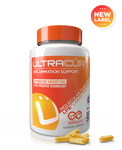The TP53 gene is mutated in many cancers. In fact, it’s the most common gene mutation found in cancer cells.
TP53 is a tumor-suppressor gene that codes for a tumor-suppressing protein called p53. In other words, the TP53 gene gives the instructions for making tumor-suppressor p53, which regulates cellular division by keeping cancer cells from growing and dividing too fast, or in an uncontrolled manner.
The p53 protein is found in the nucleus of cells throughout your body, where it binds to DNA. If your DNA is injured (by toxins, radiation, UV overexposure), it’s the p53 that dictates whether the DNA gets repaired, or whether it will undergo apoptosis (self-destruction).
If your p53 deems that repair is possible, it rallies other genes to fix the problem. If not, p53 stops the cell from dividing and gives it the apoptosis signal. By stopping faulty cellular division in its tracks, p53 prevents tumor development.[1]
The TP53 gene is so important that it’s been dubbed, “Guardian of the Genome” because of its critical role in preserving gene integrity.
The Most Frequently Mutated Gene in Human Cancer
p53 is a tumor suppressor protein and transcription factor that plays a key role in regulating cell division, preventing tumor formation by stopping cells with mutated or damaged DNA from dividing, and signaling them to undergo apoptosis.
Deactivation of the p53 transcription factor is a hallmark of virtually every tumor.
The TP53 gene is mutated in more than 50% of all human cancers, including partial or complete loss of function in breast, colon, lung, liver, prostate, bladder, brain (several types), and skin cancers.[2]
In many remaining cases, the function of retained wild type p53 protein is compromised.
With a mutated p53 protein, the cell cycle goes unchecked and damaged DNA are replicated, causing uncontrolled cell proliferation and tumors.
Many mutant p53 proteins have oncogenic traits that facilitate the ability of cancer cells to proliferate, escape apoptosis, invade, and metastasize.[3] The mutations allow cancer cells to evade cell cycle checkpoints, sidestep apoptosis and senescence, and proliferate in conditions that would kill most cells.[4]
In cancer, p53 is often missing, nonfunctional, or less active than normal.
Many tumors also have a mutant form of p53 that no longer binds to DNA. Since p53’s role is to bind to target genes and activate their transcription, non-binding mutant proteins are incapable of doing their job.[5]

Oncogenes vs. Tumor-Suppressor Genes
Two types of genes play a role in the development and growth of cancers – oncogenes and tumor-suppressor genes. Typically it takes mutations in both oncogenes and tumor-suppressor genes for cancer to develop.
Oncogenes are normal genes that become mutated, causing them to be perpetually turned on. These genes code for proteins that control cell division. Their continuous activation could be thought of as having the accelerator stuck in the down position on a car.
Tumor-suppressor genes on the other hand, code for proteins that repair damaged DNA so it can’t become a cancer cell... or program cell death so it can’t replicate. Think of this like the brakes on a car.

2 Types of Gene Mutations – Germline vs. Somatic
In addition, there’s more than one type of genetic mutation that can contribute to cancer.
Germline mutations (inherited mutations) are the ones most people think of when they get their genes tested. These mutations are with you from conception and affect every cell in the body.
Germline mutations in the TP53 gene are uncommon and are usually associated with a specific cancer syndrome linked to cancer in children and young adults.
Somatic mutations (acquired mutations) aren’t present at birth, but arise later and are linked only to the specific type of cell that names the cancer (i.e., lung cancer cells). Somatic or acquired mutations are by far the most common mutation linked with cancer.[6]

How the TP53 Helps Prevent Cancer
TP53 is supposed to repair DNA or signal apoptosis so faulty DNA can’t be passed on to daughter cells.
The TP53 gene is mutated in more than half of cancers, thereby allowing the cancer cells to find additional ways to inactivate and alter the gene. New ways to sustain cancer growth are called “gain-of-functions.”[7]
These “gain-of-functions” can include:
- Promoting resistance to cancer drugs
- Altering metabolism to give cancer cells an advantage over normal cells
- Promoting tumor spread (metastases)
- Inhibiting apoptosis of cancer cells
- Enhancing cancer growth
- Provoking genetic instability
- Facilitating angiogenesis (development of new blood vessels to support the cancer)
How the TP53 Gene Becomes Inactivated
There are thousands of toxins in our environment that can mutate your TP53 genes, as carcinogens are ubiquitous.
These could include tobacco, excessive UV rays, air or water pollution, fungi, bacteria (i.e., H. pylori), food additives, cleaning and yard chemicals, personal care chemicals, and more.
In your quest to stay cancer-free, it’s important to stay as toxin-free as possible.
Once Mutated, Always Mutated?
For obvious reasons, researchers have been seeking ways to activate or reactivate the TP53 gene. The science is complex, but advancing.
MDM2 is pro-oncogenic and inhibits TP53. Synthetic MDM2 inhibitors are being studied for people with blood cancers.[8] The strategy behind this is to stop MDM2 from binding to and deactivating TP53.
On a more natural level, plant-based foods can directly reduce MDM2 expression, and/or stimulate p53 expression
Reactivate Your p53 Pathway
The p53-MDM2 pathway is often dysregulated in cancer. That’s why efforts are being made to discover ways to better regulate the p53-MDM2 pathway.
The following natural substances are being used and studied for their effect on the p53-MDM2 pathway.[9]

1. Curcumin. Studies show curcumin inhibits cell proliferation and induces cell apoptosis, regardless of p53 status. Curcumin also inhibits MDM2 transcription and decreases MDM2 protein levels. In addition, it induces autophagy and destroys mutant p53.
Obviously, taking a curcumin product with excellent absorption properties such as UltraCür® is key to this strategy. Many curcumin products lack these absorption abilities. And you don’t want to assume it’s having an effect when it might be not even reaching your cells.
2. Berberine. Natural alkaloids such as berberine also target the p53-MDM2 pathway in human cancer. It was previously known that berberine triggers MDM2 degradation.[10] A recent study further shows that berberine down-regulates MDM2 expression, independent of p53.[11]
Berberine is the primary ingredient in our Onco-Adjunct™ Pathway 3 product and a leading ingredient in our recently launched blood sugar and weight management product, UltraMetabolic™.

3. Indole-3-Carbinol (I3C). Indole-3-carbinol is a phytonutrient found in many cruciferous vegetables such as watercress, kale, spinach, broccoli, cauliflower, Brussels sprouts, and chard.
I3C inhibits MDM2 from binding with p53... leaving p53 free to do its job. Cruciferous veggies also contain other phytonutrients associated with overall good health.
However, most people don’t consume enough of these veggies for therapeutic benefit. Don’t neglect food sources of I3C, but supplementation may be necessary for therapeutic benefits. Consider a source such as UltraBroc™ -- broccoli sprouts with curcumin.

4. Green Tea Compound/EGCG. EGCG is able to boost p53’s anti-cancer activity, helping to reverse the near-constant damage caused by carcinogens and oxygen metabolism.
Scientists found that EGCG and MDM2 bind at the same location on p53. In other words, EGCG competes with MDM2 and protects p53 from being degraded by MDM2.[12]
EGCG is found in green tea, but is also packaged as an herbal supplement. It will be included in our forthcoming Onco-Adjunct™ Pathway 4 product.

5. Melatonin. Melatonin down-regulates MDM2 genetic expression and increases p53 activity in cancer cells.[13]
Scientists are currently studying dozens of other compounds for their impact on the p53 pathway.

Listen to Today’s Podcast
Go behind the scenes with podcast guest, Ed Fletcher, a decades-long grower and supplier of herbs to the supplement industry.
Gain from his insider knowledge of how to evaluate supplements... how to narrow the seven on the shelf to the one best... which herbal companies have the best reputation... and the three unbeatable herbs to keep around for wintertime use.
Watch today on YouTube... or listen on Spotify.
Watch the video on YouTube now. Prefer audio only? Listen on Spotify now.




